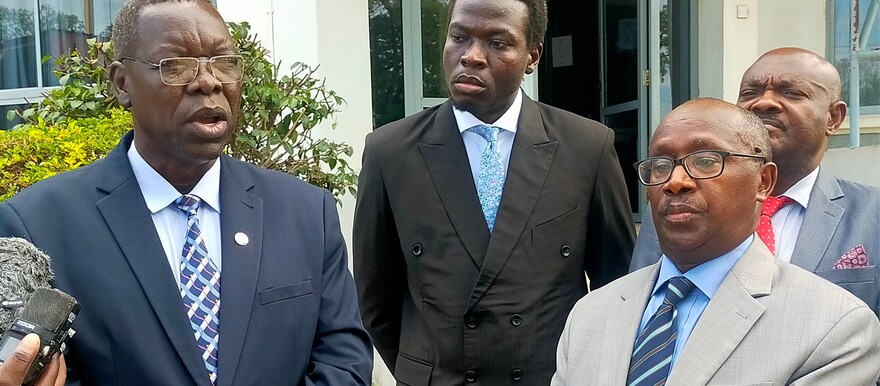The National Constitutional Amendment Committee (NCAC) on Thursday presented the Non-Governmental Organization (NGOs) and the Relief and Rehabilitation (RRC) Acts which were amended per the peace agreement to the justice ministry.
Addressing reporters after submitting the amendment bills to Justice Minister Ruben Madol Arol, Gichira Kibara, the chairperson of the NCAC, said the two bills will regulate the activities of the NGOs as well as the Relief and Rehabilitation Commission (RRC).
He said the NGO law will ensure that NGOs have an enabling environment to operate and do their work without disruption and undertake projects for the benefit of the people of South Sudan.
“We have made amendments to ensure that the NGOs have a clear process of registration, a clear process for the way they govern their activities, and for the commission to be able to look at their activities and ensure that whatever they are doing is for the benefit of the people rather than for their benefit,” he said. “We have also strengthened the provisions for appeal. In case they are dissatisfied by the decision not to register them, then they have a provision for appeal to the minister to ensure that registration is not denied without adequate reasons.”
“We have also provided for them (NGOs) to give annual reports to the Commission to ensure that their financial activities are properly carried out and people are benefiting from their activities,” Kibara added.
He said the NGOs will now be able to self-regulate as they have created a body known as the NGOs Forum which will bring them together so that they can deal with their internal matters and ensure that they monitor each other. If an NGO is not carrying out its function properly, then another NGO will be able to say that the other NGO is not operating properly.
According to Kibara, the main changes in the RRC law have to do with incorporating stipulations of the peace agreement in the appointment of the commissioners because they are now supposed to be appointed by the president in consultation with the vice presidents, as required by the agreement.
“The commission is also supposed to be restructured to make sure that it is more effective in carrying out its functions under the law and the constitution,” he stressed.
Kibara also said that the NCAC will complete the amendment of the telecommunications, mining, investment, transport, and pension laws within the next six months if they get the necessary support from all the stakeholders, including the government, in terms of paying the allowances of the NCAC members.
For his part, Dr. Isaac Gabriel Awow, the Undersecretary in the Ministry of Justice and Constitutional Affairs, said both the NGO and RRC laws are complementary and will regulate the activities of NGOs in the country.
“The issue of NGOs is a concern of many citizens of this country and the committee has worked very hard and amended most of the provisions of the NGOs Act to make sure it complies with the agreement and the constitution,” he said. “It is provided in this amendment also that they secure the 30 percent for women and streamline the process for appointment which includes citizens who can get to be employed.”
Awow revealed that the amended laws bills will be taken to the cabinet and later to parliament to pass into law.




